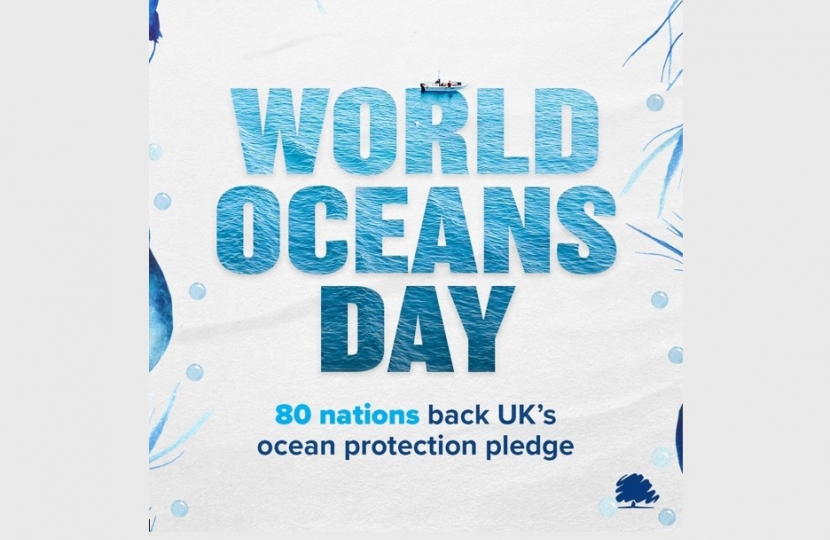
Today is World Oceans Day, and a fitting time to talk about how the UK is a world-leader in protecting the world's oceans and the habitats and species they support:
How is the UK leading the international effort?
Under UK leadership, 80 countries have now signed up to an international target to protect at least 30 per cent of the world’s ocean by 2030. Countries from all four corners of the world - from India to Guyana, South Korea to Austria have pledged to support the ‘30by30’ commitment which is being championed by the UK-led Global Ocean Alliance and the High Ambition Coalition for Nature and People, co-chaired by the UK, Costa Rica and France.
This next milestone follows a successful meeting of the G7 Climate and Environment ministers, during which all members agreed to champion the global ‘30x30’ target to conserve or protect at least 30 per cent of the world’s land and at least 30 per cent of the world’s ocean by 2030, as well as committing to ‘30x30’ domestically.
At last months’ G7 Climate and Environment Ministerial meeting, hosted by the UK, ministers agreed to a number of ambitious commitments to drive urgent ocean action, including:
- Committing to Net Zero emissions by 2050 at the latest, with deep emissions reduction targets in the 2020s, and keeping the 1.5 degree temperature limit within reach – and where we recognise that climate action is ocean action;
- To support the ‘30by30’ target to conserve or protect at least 30% of the global ocean by 2030 including through protected areas and Other Effective area-based Conservation Measures, in addition to domestic 30by30 commitments;
- An agreement to strengthen support for the Ocean Risk and Resilience Action Alliance;
- Working to conclude the negotiation of a new and ambitious legally binding instrument under UNCLOS on the conservation and sustainable use of marine biological diversity of areas beyond national jurisdiction (the BBNJ Agreement), to support increased ocean protection;
- To fully engage in discussions or negotiations on options to tackle marine plastic litter and microplastics, including strengthening existing agreements, a potential for a new global instrument, and multi-stakeholder,
- To take action to tackle ghost fishing gear, including working with or supporting initiatives such as the Global Ghost Gear Initiative and to carefully consider the recommendations of the UK-commissioned OECD report ‘Towards G7 Action to Combat Ghost Fishing Gear’.
- And to support these commitments, the G7 Ocean Decade Navigation Plan, agreed under the UK’s Presidency, establishes a framework for the G7 to collaborate and advance our collective work on transformational ocean science for ocean action throughout the UN Decade of Ocean Science for Sustainable Development.
What about UK waters?
The UK has also launched plans to increase protections for England’s waters through a pilot scheme to designate marine sites in England as “Highly Protected Marine Areas”. The selected sites would see a ban on all activities that could have a damaging effect on wildlife or marine habitats:
- This follows the independent Benyon Review, which recommended that Highly Protected Marine Areas would have an important role in helping the marine ecosystem recover. The review was commissioned in 2019 to look at how these areas could be introduced and the Government has today published its response to the review. As well as helping drive marine recovery, the review also highlighted other potential benefits of the sites, including increased tourism.
- The sites to be piloted could be in or outside of existing Marine Protected Areas where they would benefit from a substantially higher level of protection. They will be identified by Natural England and the Joint Nature Conservation Committee with input from stakeholders with a formal consultation set to launch next year.
- This comes as Defra and the Ocean Conservation Trust publish the results of the largest ever survey in England and Wales on public attitudes to our oceans. The survey finds that 85% of people consider marine protection personally important to them. Of those who had visited our coastlines last year, 80% said it was good for their physical health and 84% said it was good for their mental health.
- The findings also show that when asked about the greatest threats to the marine environment, participants were most concerned about pollution, with overfishing, climate change and loss of marine habitats also ranking highly.
The UK has also further advanced its role as a global leader in ocean protection by moving to full membership of the Ocean Risk and Resilience Action Alliance (ORRAA). The Alliance brings together the financial sector, governments, non-profit organisations to pioneer innovative ways of driving investment into critical ecosystems like reefs, mangroves, seagrass beds, wetlands and beaches that provide the nature-based-solutions to build resilience against climate change.

